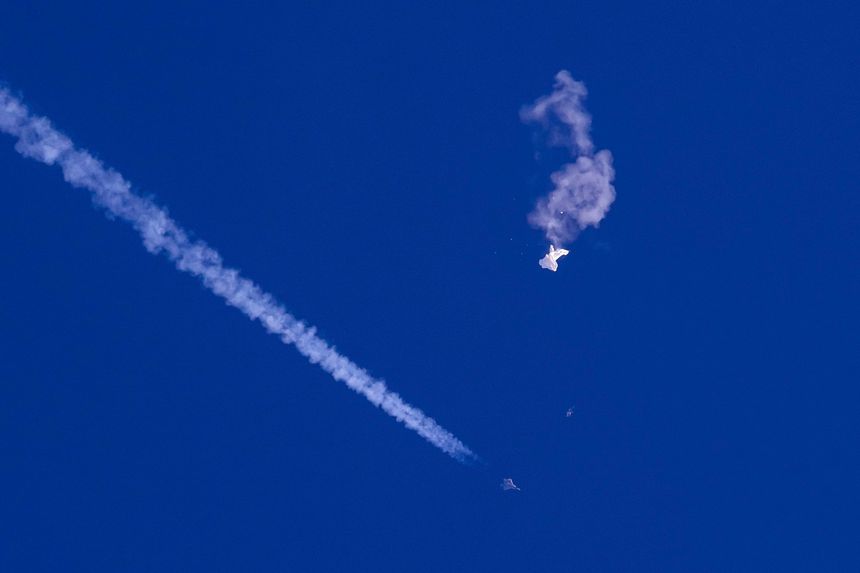
The remnants of a large balloon drift above the Atlantic Ocean, just off the coast of South Carolina, with a fighter jet and its contrail seen below it, Feb. 4.
Photo:
Chad Fish/Associated Press
President Biden and his Boswells are taking a victory lap after his decision to shoot down a Chinese surveillance balloon that spent at least a week over U.S. territory. The decision warrants support, but there are many questions about the balloon flight that deserve answers that aren’t provided by the triumphalist White House spin.
Start with the chronology of when the balloon crossed into U.S. airspace and the long delay in shooting it down. Mr. Biden said Saturday that on Wednesday he had ordered the Pentagon to take down the balloon. But that was already half a week after the balloon had entered the U.S. over Alaska, crossed into Canada and then into Montana.
Mr. Biden said his military advisers wanted to wait to shoot down the spy balloon until it reached U.S. territorial waters in the Atlantic Ocean. The justification for delay was the risk of falling debris, but that is hard to credit.
The Washington Post’s
David Ignatius
reports an unintentionally amusing Pentagon claim that shooting down the balloon at 60,000 feet would have endangered 2,000 people in Montana. Not 2,500? How could anyone know such a specific number? In any case, the balloon entered Alaskan airspace days earlier. Was there no safe place to down the balloon in that vast and sparsely populated state? Let’s hope Navy divers can recover the balloon’s intelligence-gathering equipment intact.
Another question is when the Administration first spotted the balloon crossing into U.S. airspace. Sensors should be able to detect an air intruder, even one flying quietly at 60,000 feet, and if they failed to do so the public should know about this hole in our defenses.
An undetected balloon would be able to deliver a nuclear explosive that could detonate above the ground and cripple the U.S. electrical grid with an electromagnetic pulse. That’s all too real a scenario if there is a major U.S. conflict with China, or for that matter with any major adversary. The Administration’s whispers to the press that Chinese balloons also crossed into U.S. space in the Trump years may be true, but it’s hardly reassuring.
Other questions for the White House include whether and when it raised the balloon issue with Beijing, and how the Chinese responded. Did they lie to U.S. officials the way their foreign ministry lied to the world on Friday in calling the balloon merely a “civilian airship” doing mainly “meteorological” data collection? Media reports say the White House kept its knowledge of the balloon under wraps until it was spotted by civilians on the ground, which made disclosure unavoidable.
It’s fair to wonder if the Administration hoped the balloon would cross the U.S. into the Atlantic without public notice. Secretary of State
Antony Blinken
was scheduled to visit Beijing this week in a high-stakes attempt to put U.S.-China relations on a less contentious footing. So much for that. On Friday Mr. Blinken postponed the trip, and the balloon fallout will make its resumption harder.
The Chinese response to the shootdown was relatively mild by its standards, albeit reserving “the right to make further responses if necessary.” But sending a balloon to spy on the U.S. on the eve of the talks was a reckless, if all too typical, Communist Party provocation.
It’s bad enough if the People’s Liberation Army launched it to scuttle the Blinken visit. It’s worse if the spy flight was sanctioned by the Politburo and President
Xi Jinping.
In that case the conclusion has to be that they wanted to test Mr. Biden. Is the U.S. President so eager to court better relations that he’d overlook the spy balloon if it wasn’t detected? This is familiar Chinese diplomatic behavior to probe for weakness in an adversary.
Congress will no doubt seek answers, and the episode may have a silver lining if it expands the American public’s understanding about homeland vulnerability. A majority of Americans have awakened to China’s aggressive behavior, but isolationists in both parties are selling a fantasy that we can be safe if we withdraw from engagement overseas.
There is no such immunity in a world of hostile state actors and rapidly advancing military technology. The Biden Administration should be helping Americans understand that reality rather than patting itself on the back with mission-accomplished briefings.
Copyright ©2022 Dow Jones & Company, Inc. All Rights Reserved. 87990cbe856818d5eddac44c7b1cdeb8
Appeared in the February 6, 2023, print edition.








